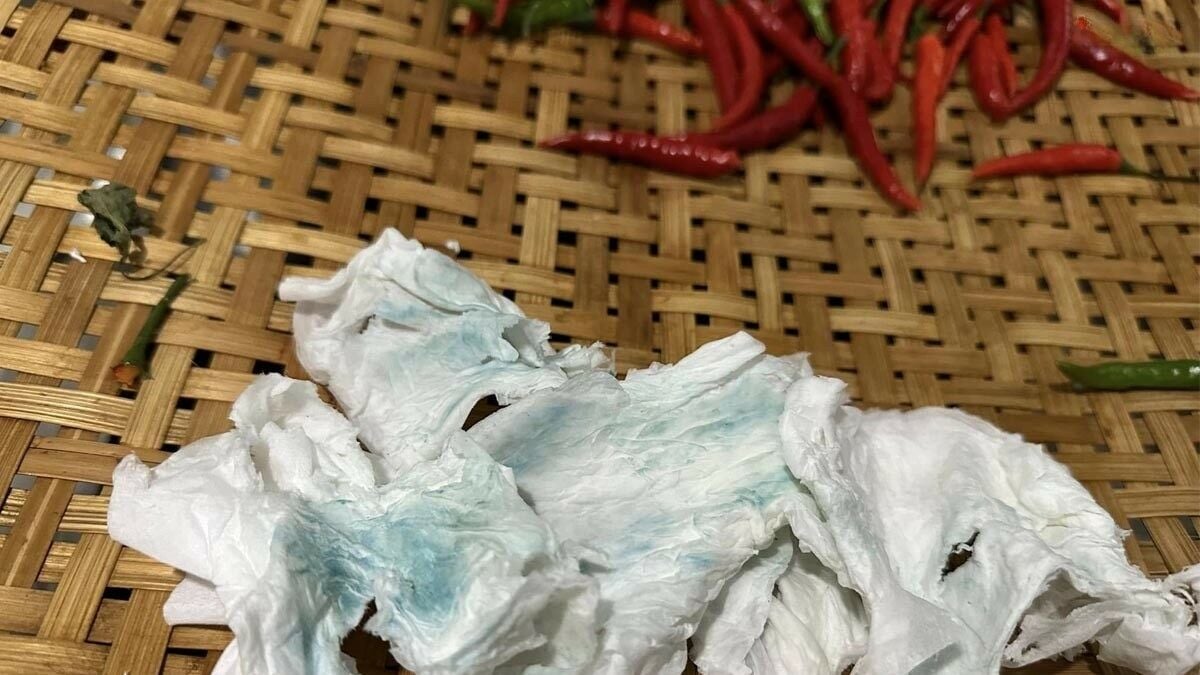Concerns raised over blue-coloured residue on Thai chillies

A Facebook user recently raised concerns after discovering a blue residue on chillies intended for drying, seeking advice from knowledgeable individuals. This incident highlighted the use of Mancozeb, a fungicide commonly applied to perishable vegetables prone to fungal attacks.
The user shared their experience in an online consumer group, describing how they purchased chillies from the market, packaged in bags, for making dried chillies. Upon wiping the chillies before washing, they noticed a blue-green hue on the surface.
Initially suspecting that the colour came from their hands, closer inspection revealed a coating on each chilli. Despite washing, the faint bluish tint persisted. The user expressed relief at having washed everything before cooking and sought answers from the community.
Following the post, several Facebook users commented, suggesting that the substance was likely Mancozeb. This fungicide is widely used on vegetables susceptible to decay and fungal diseases.
Europe has banned the use of Mancozeb due to its potential risks to reproductive health and dangers to infants. It is classified as a Category 1B reproductive toxin and is known to disrupt the endocrine system in humans. Additionally, the chemical poses significant threats to aquatic life.
The blue-green residue on the chilli peppers is similar to previous reports about onions with a similar tint, which left a coloured stain when touched.
While washing fruits and vegetables with plain water can remove some Mancozeb residue, using certain substances like hydrogen peroxide, chlorine dioxide, or peeling the produce can enhance the removal process. Heat treatment after washing can also be effective in eliminating the fungicide.
Consumers are advised to avoid purchasing produce with such visible residues. Although not yet banned in some regions, consumer pressure could compel producers and sellers to discontinue its use.
A decline in sales of affected produce might force a change in practices if consumer demand drops, reported KhaoSod.

What Other Media Are Saying
- Eudebates highlights the EU’s decision to ban Mancozeb, a harmful pesticide, prioritising public health and environmental safety as part of its Farm to Fork strategy aiming for sustainable food systems. (read more)
Frequently Asked Questions
Here are some common questions asked about this news.
Why is Mancozeb still used in some regions despite its known risks?
Mancozeb’s effectiveness against fungi persists in its use, but regulatory gaps allow continued application despite health concerns.
How can consumer awareness influence agricultural practices regarding fungicide use?
Informed consumers can pressure producers by choosing safer products, potentially leading to reduced usage of harmful chemicals.
What if more countries followed Europe’s lead in banning Mancozeb?
A global ban could significantly decrease health risks and environmental impact, promoting safer agricultural practices worldwide.
How does Mancozeb affect aquatic life, and what are the broader environmental implications?
Mancozeb harms aquatic ecosystems by disrupting reproductive health in aquatic organisms, affecting biodiversity and water quality.
What alternative measures can be used to protect crops from fungal attacks without relying on Mancozeb?
Alternative methods include organic fungicides, crop rotation, and integrated pest management, promoting sustainable agriculture.
Latest Thailand News
Follow The Thaiger on Google News:


























